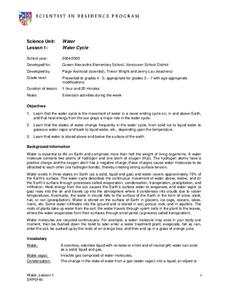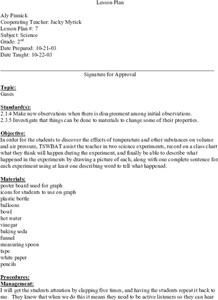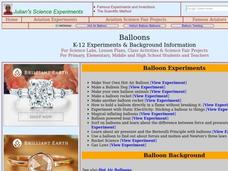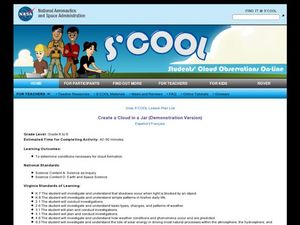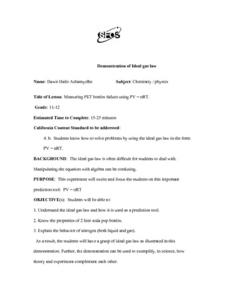Curated OER
Water Cycle
Young scientists explore Earth elements by conducting an experiment. They define water vocabulary terms such as condensation and precipitation. In addition, they conduct a water experiment in which they build a terrarium, so they can...
Mr. E. Science
Sound
Since light travels faster than sound, some people may appear bright until you hear them speak. The presentation covers what sound is, how fast it travels in various mediums, properties of sound, hearing, and the parts of the human ear.
Curated OER
Water and Ice
Students observe and discuss what happens when water turns to ice and when ice turns into water. In this freezing and melting lesson plan, students observe ice and water and complete hands on activities that change their properties.
Curated OER
Rain Formation
First graders investigate the different water formations by conducting an experiment. In this water properties lesson, 1st graders examine jars filled with ice, rain water, air and snow in their class. Students predict what will happen...
Curated OER
Is the Earth Warming? a Test of the Effect of Increased Carbon Dioxide on the Thermal Properties of Air
Learners investigate the environmental and economic effects of increased carbon dioxide (CO2) content in the atmosphere.
Curated OER
Chemical Reactions
In this chemical reaction worksheet, students investigate the results of mixing calcium chloride with sodium bicarbonate. They observe the chemical and physical changes that occur, identify the properties of the chemical before and after...
Curated OER
The Effects of Storms
An excellent way to review a chapter or unit on storms, this worksheet features vocabulary review (gust, evacuation, storm surge, salinity), concept review (effects and details about hurricanes), skills/process review (normal high tide...
Curated OER
Introduction to Flight: A Math, Science and Technology Integrated Project
Seventh graders review graphing procedures and practice locating points using x,y coordinates. Students calculate the areas of the top and bottom surfaces of the airfoil. They construct a test model of the airfoil.
Chymist
The Solubility of a Salt in Water at Various Temperatures
An educational activity allows young chemists to test the solubility of different types of salt at various temperatures. Groups create a graph using data from unsaturated, saturated, and supersaturated solutions.
Steinhardt Apps
Kinetic Molecular Theory
Building off young chemists' knowledge of the states of matter, kinetic molecular theory is the focus of the unit. Eight days of lessons including multiple demonstrations, one lab experiment, directed instruction, and worksheets,...
Curated OER
Effects of Ozone in the Air
Fifth graders learn how ground-level ozone is an air pollution problem. Students measure ozone levels and graph the results.
Curated OER
What's the Connection Between Convection and Inversion?
Ninth graders observe a simulation demonstrating the difference between convection and inversion. They explain where and when convection and inversion layers occur and how each impacts air quality, and by connection, human health.
Curated OER
Meteorology Madness
Students probe the dynamic weather changes through several hands-0n activities in this seven lessons unit. The hydrologic cycle, clouds, atmosphere, air movement, fronts, and forecasting form the components presented in this unit.
Curated OER
Gases
Second graders work with gases to determine what the effects of temperature are on volume and air pressure by working with balloons. Also, they experiment with vinegar and baking soda. They predict the outcomes of these experiments, and...
Curated OER
Glurch II
Students make glurch using materials provided. In this chemistry lesson, students identify the physical properties of glurch. They compare its properties to commercially prepared ones.
Curated OER
This Lesson Is a Breeze, So Don't Blow It!
Students conduct an experiment to show that air is all around us and that wind is the movement of air. They construct a weather vane to determine which direction the wind is blowing.
Curated OER
Balloons
Students explore the different types of balloons. In this materials instructional activity students can complete several experiments including building their own hot air balloons, making balloon animals and experimenting with static...
Curated OER
Fire Triangle in the Forest
Students investigate the physical properties of fire by creating storyboards. In this elements lesson plan, students view a video clip of forest fires and identify the cause. Students create large storyboards defining the three...
Curated OER
Properties of Dust
Students examine the dust in their classroom and relate it to the dust in space. In this investigative lesson plan students collect dust and graph their findings.
Curated OER
Solids, Liquids, and Gases
Learners explore solids, liquids, and gasses and categorize and describe the three states of matter. In this chemistry lesson, students categorize items as solid, liquid, or gas based on the definitions given by the teacher. Learners...
Curated OER
What's the Matter?
First graders identify solids, liquids, and gases. For this matter lesson, the teacher guides students through numerous demonstrations as they determine the properties of solids, liquids, and gases and classify things as each. As the...
Curated OER
Create a Cloud In a Jar
Students investigate cloud formation. In this weather lesson, students examine how clouds are formed. Students participate in experiments that model how water vapor in the air works.
Curated OER
Warm and Cold Air
Students examine what happens to air when it is heated or cooled. They conduct an experiment using bottles and balloons, record and discuss their observations, and write a hypothesis.
Curated OER
Demonstration of Ideal Gas Law
You know that liquid nitrogen turns into a gas at room temperature. Place some in a two-liter bottle for a physics demonstration of the ideal gas law. Beware, however; this is a dangerous demonstration! Not to mention that you may not...


